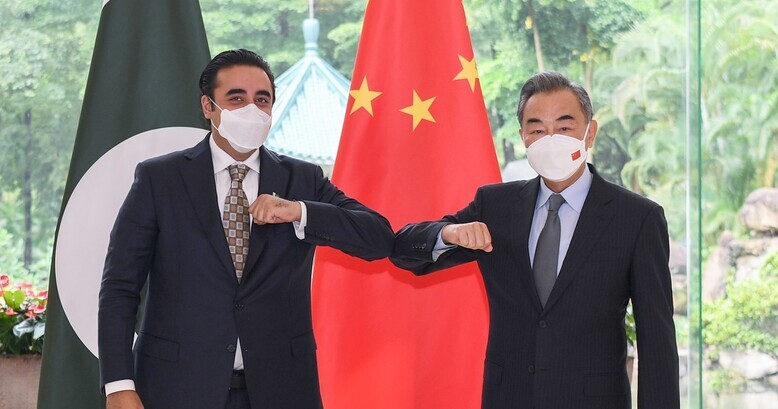hankyoreh
Links to other country sites 다른 나라 사이트 링크
China slams IPEF as coercing Asian countries to choose between China, US

China is voicing its strong displeasure with the Indo-Pacific Economic Framework (IPEF), which was launched Monday under US leadership.
“The Asia-Pacific has once again come to a crossroads of history,” declared Chinese Foreign Minister Wang Yi while attending the 78th session of the UN Economic and Social Commission for Asia and the Pacific, which took place via videoconference the same day.
“[We] unequivocally reject any attempt to introduce military blocs and bloc confrontation into the Asia-Pacific region,” he stressed.
Emphasizing that “peace and prosperity in the Asia-Pacific bear not only on the destiny of the region, but also on the future of the world,” he added, “We should draw the lessons from history, forge ahead, jointly build an Asia-Pacific community with a shared future, and create new splendor in Asia-Pacific cooperation.”
In a press conference following a meeting with his Pakistani counterpart on Sunday, Wang Yi characterized the US strategy for the Indo-Pacific region as “keen on creating various sorts of small cliques by ganging up on others under the banner of ’freedom and openness.’”
“The strategy aims to contain China and attempts to make Asia-Pacific countries ‘pawns’ of U.S. hegemony,” he declared.
Chinese Foreign Ministry spokesperson Wang Wenbin said Monday that the Asia-Pacific region “should become the pacesetter of peace and development, not the arena of geopolitics.”
“All kinds of conspiracies that attempt to create camp politics [. . .] and wage a new Cold War in the Asia-Pacific region are doomed to fail,” he added, stressing that attempts to isolate China would only leave other countries themselves isolated.
“Is the US politicizing, weaponizing and ideologizing economic issues and coercing regional countries to take sides between China and the US by economic means?” he asked.
“Deliberately creating economic decoupling, technological blockade, or industrial chain breakage, and aggravating the supply chain crisis will only inflict grave consequences on the world, including the US itself,” he warned.
Ahead of US President Joe Biden’s visits to South Korea and Japan between Friday and Tuesday, China attempted in various ways to deter activities such as the launch of the US-led IPEF.
In a May 18 telephone conversation with White House national security advisor Jake Sullivan, Chinese Communist Party Politburo member Yang Jiechi — who is regarded as the “control tower” of China’s diplomatic efforts — warned that “any act that undermines the fundamental and long-term interests of countries in the region out of selfish interests is short-lived and doomed to fail.”
The Chinese Foreign Ministry also said it raised a protest over the mentioning of the “importance of preserving peace and stability across the Taiwan Strait” in a joint statement by the South Korean and US leaders on Saturday.
In his press conference, Wang Wenbin said, “The Chinese side has lodged solemn representations with relevant sides.”
“Taiwan is part of the Chinese territory and the Taiwan question is purely China’s internal affairs. We will never allow any country to meddle in China’s domestic affairs in any form,” he continued.
The response this year was relatively muted in comparison with China’s vocal condemnation of the same language in a statement from a May 2021 summit between Biden and then-South Korean President Moon Jae-in. At that time, it warned that the countries involved “should be cautious with their words and actions on Taiwan and not to play with fire.”
By Choi Hyun-june, Beijing correspondent
Please direct questions or comments to [english@hani.co.kr]
Editorial・opinion
![[Column] Has Korea, too, crossed the Rubicon on China? [Column] Has Korea, too, crossed the Rubicon on China?](https://flexible.img.hani.co.kr/flexible/normal/500/300/imgdb/original/2024/0419/9317135153409185.jpg) [Column] Has Korea, too, crossed the Rubicon on China?
[Column] Has Korea, too, crossed the Rubicon on China?![[Correspondent’s column] In Japan’s alliance with US, echoes of its past alliances with UK [Correspondent’s column] In Japan’s alliance with US, echoes of its past alliances with UK](https://flexible.img.hani.co.kr/flexible/normal/500/300/imgdb/original/2024/0419/2317135166563519.jpg) [Correspondent’s column] In Japan’s alliance with US, echoes of its past alliances with UK
[Correspondent’s column] In Japan’s alliance with US, echoes of its past alliances with UK- [Editorial] Does Yoon think the Korean public is wrong?
- [Editorial] As it bolsters its alliance with US, Japan must be accountable for past
- [Guest essay] Amending the Constitution is Yoon’s key to leaving office in public’s good graces
- [Editorial] 10 years on, lessons of Sewol tragedy must never be forgotten
- [Column] A death blow to Korea’s prosecutor politics
- [Correspondent’s column] The US and the end of Japanese pacifism
- [Guest essay] How Korea turned its trainee doctors into monsters
- [Guest essay] As someone who helped forge Seoul-Moscow ties, their status today troubles me
Most viewed articles
- 1[Column] The clock is ticking for Korea’s first lady
- 2After 2 months of delayed, denied medical care, Koreans worry worst may be yet to come
- 3[Column] Has Korea, too, crossed the Rubicon on China?
- 4Samsung barricades office as unionized workers strike for better conditions
- 5All eyes on Xiaomi after it pulls off EV that Apple couldn’t
- 6[Correspondent’s column] In Japan’s alliance with US, echoes of its past alliances with UK
- 7US overtakes China as Korea’s top export market, prompting trade sanction jitters
- 8Hong Se-hwa, voice for tolerance whose memoir of exile touched a chord, dies at 76
- 9[Photo] Smile ambassador, you’re on camera
- 10[Editorial] When the choice is kids or career, Korea will never overcome birth rate woes